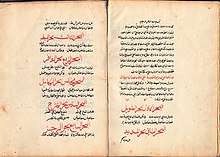Beher (poetry)
Beher (Arabic/Persian/Urdu: بحر) in Urdu poetry is the meter of a sher (couplet). Essentially, beher is a specific pattern, combining the arkaans (dummy meaningless words) of Urdu prosody that define the "length" of a sher. However, generally beher is categorized in three classes: Short, medium, long, depending upon the length of the sher of the ghazal.


For a ghazal, since all the shers in it should be of the same beher, determining the beher of one sher (or even one line of the sher) is enough to determine the beher of the entire ghazal. For example, in this ghazal of Ghalib, the length and meter of the ashaar is same throughout. In terms of the European method of scansion, the metre can be written as follows (where "x" = long or short, "u" = short, "–" = long, "u u" = one long or two short syllables):
- x u – – u – u – u u –
- koii ummiid bar nahiin aatii
- koii suurat nazar nahiin aatii
- aage aatii thii haal-e-dil pe hansii
- ab kisii baat par nahiin aatii
- jaanataa huun savaab-e-taa'at-o-zahad
- par tabiiyat idhar nahiin aatii
- hai kuchh aisii hii baat jo chup huun
- varna kyaa baat kar nahiin aatii
- kaabaa kis muunh se jaaoge 'Ghaalib'
- sharm tumako magar nahiin aatii
The ghazal above is written in a beher called: khafiif musaddas makhbuun mahzuuf maqtu (Meter G8).[1] This is a ten-syllable beher and by the standards of Urdu poetry, is a chotii (small) beher.
As with the scansion of Persian poetry, a syllable such as miid or baat consisting of a long vowel plus consonant, or sharm consisting of a short vowel and two consonants, is "overlong", and counts as a long syllable + a short one.[2]
In Urdu prosody, unlike Persian, any final long vowel can be shortened as the metre requires,[3] for example, in the word kaabaa in the last verse above.
Names of behers
There exist many behers, but mainly there are 19 behers used in Urdu poetry. These behers are further distributed in different types, but they are not described here. The names are:
- beHr-e-rajaz
- beHr-e-ramal
- beHr-e-baseet
- beHr-e-taweel
- beHr-e-kaamil
- beHr-e-mutadaarik
- beHr-e-hazaj
- beHr-e-mushaakil
- beHr-e-madeed
- beHr-e-mutaqaarib
- beHr-e-mujtas
- beHr-e-muZaara
- beHr-e-munsareH
- beHr-e-waafer
- beHr-e-qareeb
- beHr-e-saree
- beHr-e-khafeef
- beHr-e-jadeed
- beHr-e-muqtaZeb
Examples
References
- Pritchett, Frances. "A Desert Full of Roses - The Urdu Ghazals of Mirza Assadullah Khan Ghalib".
- Thiesen (1982), p. 189.
- Thiesen (1982), p. 197.
Bibliography
- Deo, Ashwini; Kiparsky, Paul (2011). "Poetries in Contact: Arabic, Persian, and Urdu". In Maria-Kristina Lotman and Mihhail Lotman ed. Proceedings of International Conference on Frontiers in Comparative Metrics, Estonia, pp. 147–173.
- Pritchett, Frances W. (1993). "Orient Pearls Unstrung: The Quest for Unity in the Ghazal". Edebiyât vol. NS 4, pp. 119–135.
- Pritchett, Frances. "A Desert Full of Roses - The Urdu Ghazals of Mirza Assadullah Khan Ghalib".
- Thiesen, Finn (1982). A Manual of Classical Persian Prosody, with chapters on Urdu, Karakhanidic and Ottoman prosody. Wiesbaden.